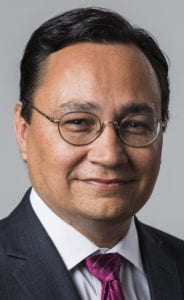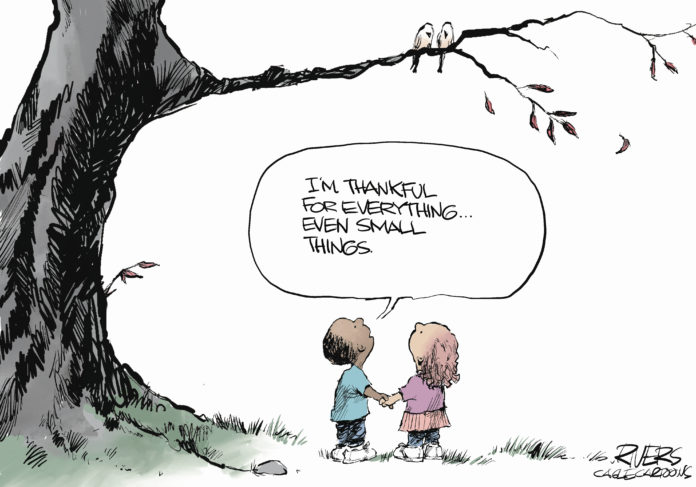BY CHUCK HOSKIN JR.
 Forty-one years ago this week I was a kindergartener at Riverside School in Vinita, OK, celebrating Thanksgiving. I could choose to make a “pilgrim” or an “Indian” costume, per my well-meaning teacher. I chose the Indian costume, which I made out of a paper sack. Then we ate and recited why we were thankful. My parents assured me later that day that I didn’t need a costume to be Cherokee because I was a Cherokee every day. That was important for me to hear. All of it was my first real and enduring Thanksgiving memory.
Forty-one years ago this week I was a kindergartener at Riverside School in Vinita, OK, celebrating Thanksgiving. I could choose to make a “pilgrim” or an “Indian” costume, per my well-meaning teacher. I chose the Indian costume, which I made out of a paper sack. Then we ate and recited why we were thankful. My parents assured me later that day that I didn’t need a costume to be Cherokee because I was a Cherokee every day. That was important for me to hear. All of it was my first real and enduring Thanksgiving memory.
I am thankful we are moving away from “Indian costumes” to celebrate aspects of American culture. I am also thankful that the joy I felt as a 5-year-old Cherokee giving “thanks” along with others in my community has only grown deeper and more meaningful over time.
The popular American Thanksgiving story is rife with inaccuracies and robs the participants of the depth of real, historical events. The story serves at times to glorify the so-called “age of discovery” and its consequences and undermines efforts at a deeper understanding of Indian Country.
I could devote an entire column and then some on the topic of the American Thanksgiving story and why well-meaning teachers giving a Cherokee child the option of dressing up like an “Indian” was maybe part of the problem. Those are important topics but not my topic for today.
More impactful than that crude “Indian costume” I made was the act of me and my fellow classmates telling each other what we were thankful for and sharing a meal together as an act of solidarity. On my best Thanksgiving, I hope I am as joyful as I was then to discover that we have common blessings to count and the collective optimism that comes with it.
The country needs a dose of that kind of Thanksgiving right now. Thanksgiving can be a wonderful reminder that we have much more in common than we have division. It suggests to us that we are “in this together” to such a degree that we find collective reason to pause, count our blessings and break bread. Taking that pause does not mean we should lose sight of what divides us, where we fall short, who our society injures or who it forgets. Rather, we can use Thanksgiving to renew our sense that we have a collective interest in addressing these issues. We can leave Thanksgiving Day thankful that, as free people, we at least have an opportunity to do so in the days ahead.
There is also a great deal else for which I am thankful. My family is at the top of the list for more reasons than I can recite here. A life in politics and public service comes always at a personal toll on family. Yet, I could not be in a position to lead without them. This is particularly true of my wife January, our First Lady, who more than anyone has made me a far better Chief than I would otherwise have been. I thank my ancestors, whose collective decisions are the reason we still have a Cherokee Nation and why I have the good fortune to be its elected chief centuries later. Friends, family and colleagues – so many of whom work every day to make the world a better place for others first, themselves a distant second – make me a better leader and person each day.
I am thankful for the Cherokee people. They have given me an opportunity to serve as Chief for this brief period of time in our long existence. In return, each day I give them my level best. More importantly, each day they show me that their unending collective “goodness” is what truly makes Cherokee Nation “great.” In the years ahead, we will need to tap into every ounce of this goodness if we are to survive, thrive and achieve our true greatness.
And, I am still thankful for that Thanksgiving celebration in kindergarten 41 years ago this week.
– Chuck Hoskin Jr. is principal chief of the Cherokee Nation








